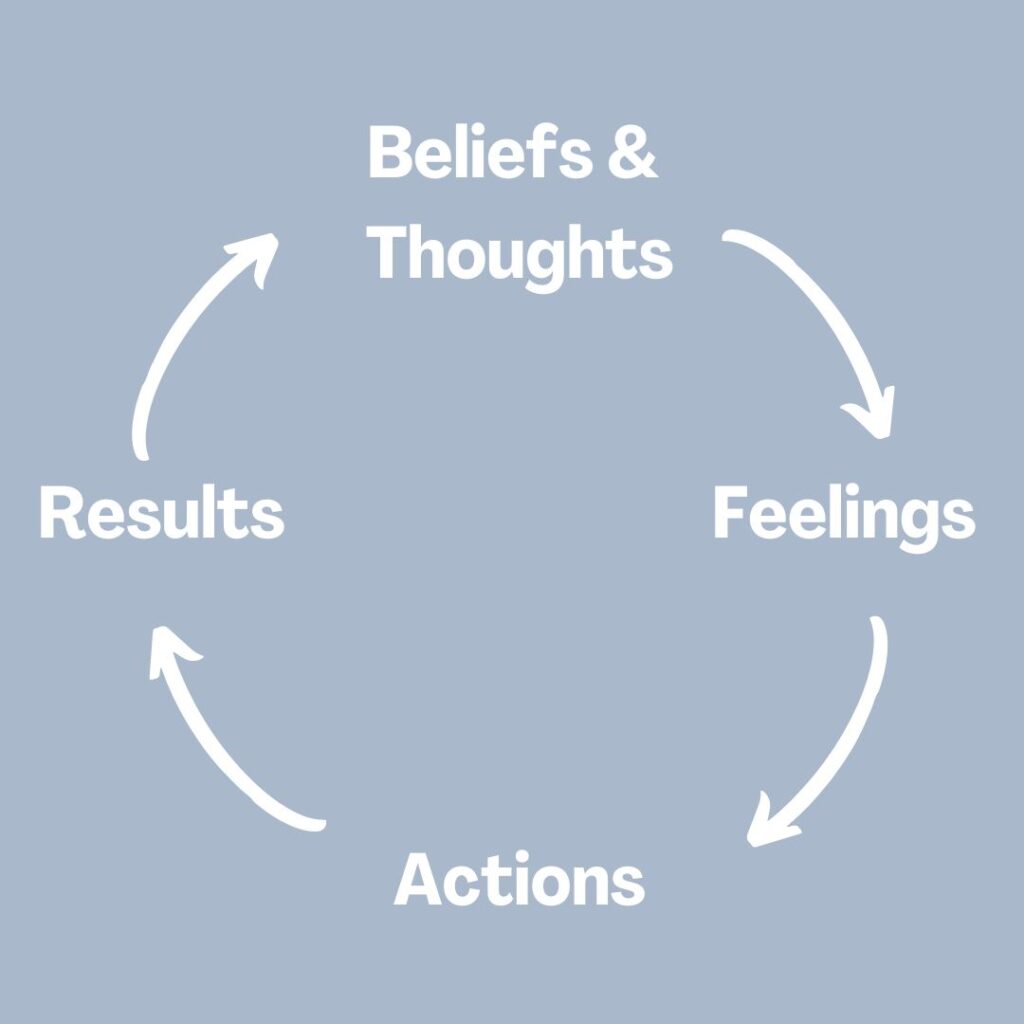You have decided on your goals, you know your “why,” you have your action plan… Everything is crystal clear (if not, read this article) about what should happen next because you have followed every goal-setting tip. By now, you should have taken your first steps toward your target, yet something is blocking you… What could it be?
Taking action can be a real emotional struggle, bringing up unpleasant feelings such as boredom, frustration, anger, self-doubt, fear, etc. In some cases, people might even suffer from ADHD, anxiety, or depression. If we truly want to get to the bottom of this challenge, we need to understand that we tend to take action based on our feelings.

Hence, to decode the real reason behind your action-taking block, we need to ask what is the emotion/feeling that comes up and how to get this emotion/feeling under control since taking action only on days when we “feel like it” is not an option. The short answer: it starts with reprogramming your mind and choosing your thoughts.
E.g., if I chose to go to the gym only on the days I feel like it, I would end up going there like five times a year. One thing that has helped me personally, and I have been practicing more often recently, is stopping myself from overthinking. If I am good at something, it is starting an inner dialogue and finding all possible reasons not to do something out of my comfort zone. But at one point, when I had had enough, I angrily said to myself: “STOP, stop thinking. If you absolutely have to think, think of something else; just do not think of anything gym related. Don’t start with your train of thought. Just GO. Just do it!”
Another big one is limiting beliefs. I believe something has to be this or that way. E.g., I do not have a university degree, which means I would only be able to earn X amount of money. Says who? How do you know this is the absolute truth? How can you replace this thought with an empowering thought?

Of course, in the end, there is still the action-taking component itself, which in my opinion, is totally doable if broken down into small enough pieces. So over here, I can only give this advice: if you have difficulties moving your a**, make the task ridiculously easy and small for yourself.
E.g., for the entire last year, I tried to convince myself that I should write for one hour a day, which I ended up doing maybe twice and wanted to cry each time. Then I changed my strategy and told myself to write for 30 minutes instead. And suddenly, I felt like a huge weight was lifted off my shoulders. I felt much happier, relaxed, and more motivated to write. Of course, I was aware of this option before, but it took action itself to truly experience its power.
As promised, here are some common reasons more in-depth that tend to block us from taking action inspired by my own experience.
Fears
Self-doubt
Change is uncomfortable and unknowingness scary. No wonder that even with the most impeccable preparation, self-doubt can kick in. Questioning yourself is expected (a sign of self-awareness!), but only to a certain extent. If it starts holding you back from everyday activities and taking action, ask yourself: what would make me feel more confident? How can I change my doubtful thought to confident one?
Imposter Syndrom
When we start working on something new, we are beginners. Period. And many of us don’t want to be seen as one. We want to be the experts; we want to be on the top right away! So many of us are blindsided by our egos and get embarrassed for no reason!
Fear of failure
For starters, let’s define the word “failure” as it can mean hundred different things to different people. I am not a fan of labeling something a “failure” or a “mistake,” as no matter how the situation turns out; usually, there is some learning or gifts (i.e. “win”) associated with that. E.g., let’s say you intended to run a marathon, but you didn’t since you were too lazy to train. However, you did train 1-2x a week, which is not sufficient for a marathon, but more than you would usually do. As a result, you didn’t hit your 42km mark, but you moved much more than before setting this goal and even managed to lower your blood pressure. So if you look at it in the goal context, it is a failure indeed. But you see a win by looking at the bigger picture (health, mood).
Of course, nobody from us wants to look foolish or not meet basic expectations, but in the goal-setting context, there is so much more to win than to lose. One needs to try!
Fear of success and fear of change
This is an interesting one as, at first glance, success is what we want, isn’t it? However, if you think about it, success is often linked to more work and more responsibility that could lead, e.g., to less free time and more stress. I have heard people fearing losing their relationships or turning back to bad habits (alcohol, smoking). No wonder because with success often comes also a certain pressure to keep up the performance, and every following performance needs to be topped by the previous one. Basically, you are as good as your last project. E.g., if Dua Lipa puts out a song that performs hyper successfully, can you imagine what the pressure is to produce the next hit?
Perfectionism
Perfectionists like to claim they have high standards, but often it masks a lack of confidence and, therefore, can be linked to fear. E.g., I am only agreeing to start working on something once I have figured out every step on my way. Preparation is important for sure, but it shouldn’t turn into procrastination. Unfortunately, uncertainty is part of life, and many things will be figured out in the process. Believe me; I almost hate to write it as I am a person who likes safety and always needs to have a plan A, plan B, plan C, etc. But I have learned that this is different from how life works, especially if you want to work on something new!
As a recovering perfectionist, I can say that we often focus on details rather than the big picture, which holds us back from moving closer to the goal. E.g., I procrastinated with starting my blog for years because I convinced myself I needed to have suitable images or good layouts for social media first. And guess what? I still don’t have them today, but I am much happier to post not-perfect posts than no posts at all!
Lack of Energy and Motivation / Lethargy
According to Medical News Today, lethargy refers to a sense of fatigue and a lack of both mental and physical energy and motivation. A person with lethargy may feel unmotivated or have an indifferent attitude toward their daily activities.
Over here, it is crucial to identify the underlying cause. If lethargy is caused by a health condition (e.g., depression, an autoimmune disease, anemia), professional medical help is needed. If the reason lies in lifestyle (e.g., thinking limiting beliefs, “I am so tired,” “I am not capable of doing this,” or e.g., choosing not to sleep enough), a coach could help.

Distractions
Emails, social media, new binge-worthy Netflix shows, text messages, chaotic environment, noise, fighting children, the list can go on and on… Solution? Create an environment that supports your focus and doesn’t undermine you. It is not YOU; nobody can focus if a new notification pops up every three minutes!
Overwhelm / Confusion
Even though I wrote this post presuming your goals have been set and the action plan ready, I need to mention this point, otherwise the list is incomplete without this common reason 😊. To overcome this, review your goals and create an action plan. If you feel this way, please read these two articles:
Let’s get ready for 2023! My 7-step process and prompts.
New Year, New Me! Now What? How to Create an Action Plan.
Did you recognize yourself somewhere in between the lines? If so, I suggest you follow these steps:
- Identify the emotion/feeling that comes up
- Substitute your limiting belief with an empowering thought
- Stop yourself from overthinking (shut down the inner dialogue)
- Start experimenting and take a tiny step toward your goal. See where it gets you! Notice how you feel.
- If you feel distracted, create an environment with minimum distractions
Light & love,
Liis
